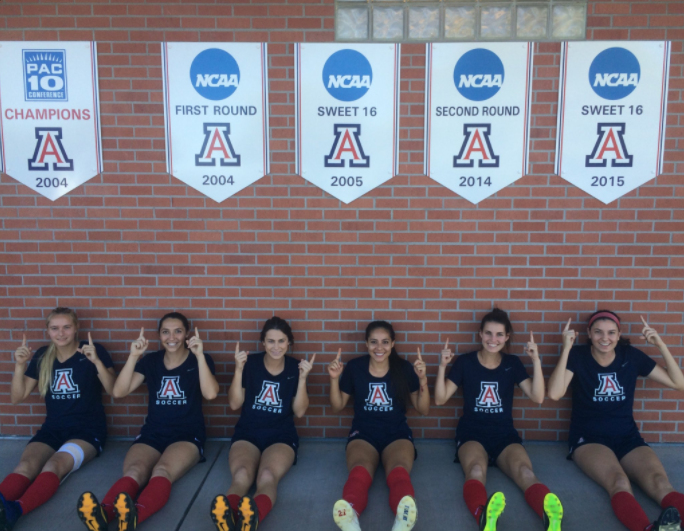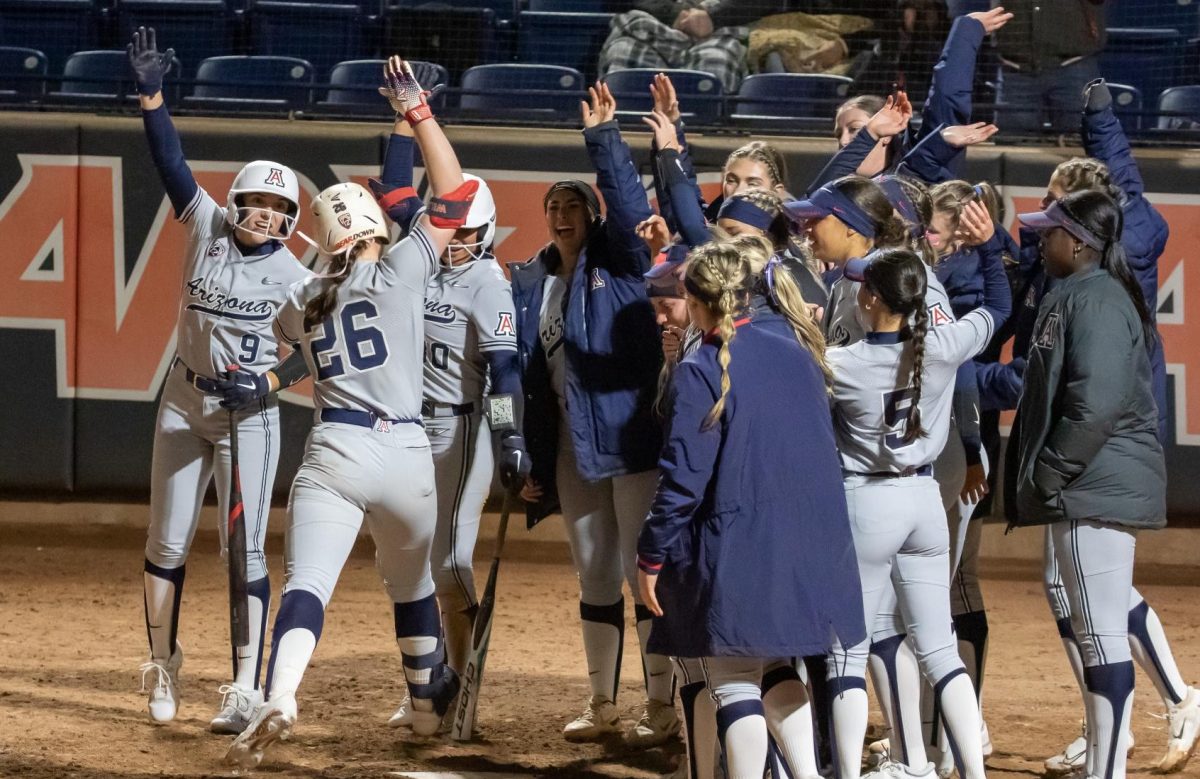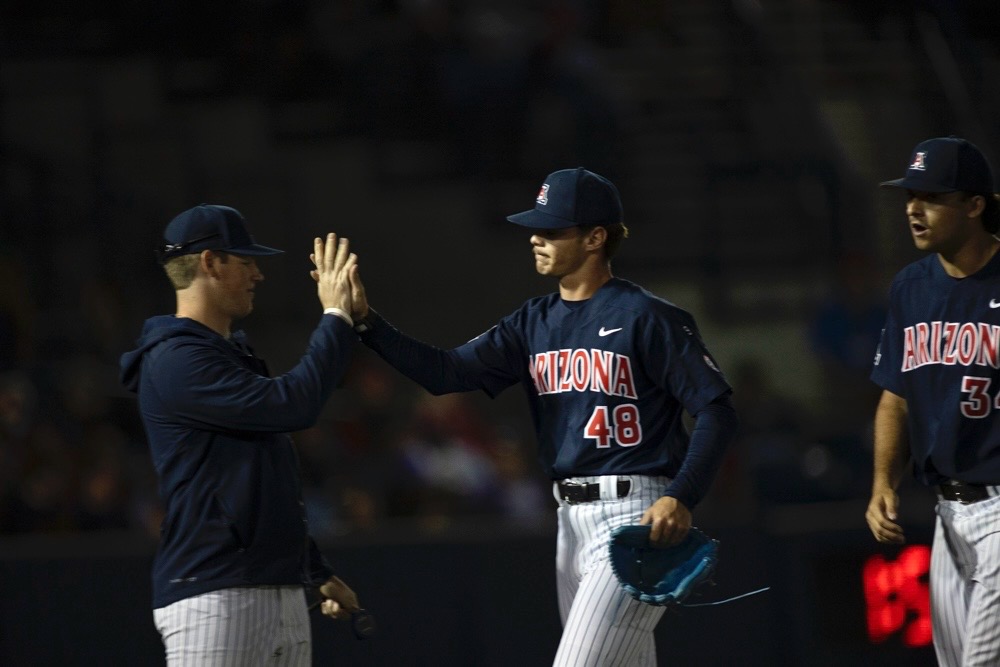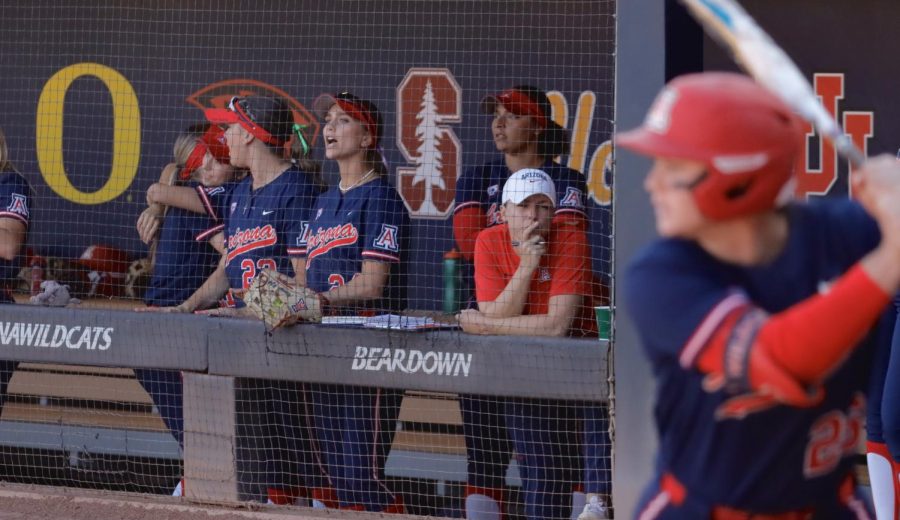It was a frigid November afternoon in Stillwater, Oklahoma, as temperatures at Cowgirl Soccer Complex dipped below freezing.
“It was so cold they had heaters out in the tents for where we would go at halftime,” Arizona head coach Tony Amato recalls. “The ball was extra hard, the grass was painted green … there were like four people in the stands.
“It was interesting environment; one I won’t forget.”
The Arizona soccer team, facing Oklahoma State on that day in 2014, was in unfamiliar territory. However, the 30-degree temperatures and the frozen turf weren’t the reasons why.
This was the first round of the NCAA Tournament; a stage the UA soccer program hadn’t reached since 2005.
“We didn’t know what to expect because we hadn’t been there before,” then-sophomore Lexe Selman-Richards said. “That was awesome … and we had nothing to lose.”
Playing like a team without any pressure on them, the Wildcats grinded out a 1-0 victory in Stillwater to advance to the Second Round, knocking off Oklahoma State on its freshly-painted home field.
“It’s kind of a blur, not because it was a while ago, but because it was such an exciting moment,” then-sophomore Paige Crouch said. “But I just remember the goal, and after the game everyone rushing on the field like we had won the National Championship game …. It gives you goose bumps.”
It wasn’t a national championship, and the Wildcats would eventually lose to Texas A&M in the next round, but the Arizona soccer program had plenty to celebrate.
“We hadn’t made the tournament in forever as a program, and we went there and won the game, which made me feel like we weren’t just happy to be in the tournament,” Amato said. “And they could’ve just been like ‘oh, we’re in the tournament. That was a great season, we have our memory,’ but we went there and grinded it out and won the game and I think that helped change the complexion of the program.”
It turns out a new standard for Arizona soccer was in the process of being set.
The next season, the Wildcats won 14 games—the second-best mark in program history—and hosted an NCAA Tournament game—a first round contest against Northern Colorado—for the first time in school history.
Arizona beat Northern Colorado, then knocked off Santa Clara in the second round, reaching the Sweet Sixteen for the second time in program history.
“No one expected us to keep going,” senior Haley Silverberg said.
It was the first time in program history that the Wildcats had won an NCAA Tournament game in consecutive seasons.
It wasn’t supposed to happen that quickly
Arizona soccer has traditionally been a losing program. From its founding in 1994 to 2005, the UA soccer program recorded just two winning seasons (in 2004 and 2005). From 2006-2012, it had a losing season each year, compiling a 39-89-11 record in that span.
The program lost at least 10 games in each season in that time frame, and with the losses piling up, the UA made a coaching change after the 2012 season, bringing in Amato from Stephen F. Austin State University.
The immediate expectations were low.
“I mean, the talk was not NCAA Tournaments, it was how can win some games and be relevant early on,” Amato said.
A long rebuild figured to be ahead.
“You got time, don’t worry, don’t stress,” UA athletic director Greg Byrne told Amato when he first took over the job.
Not a lot of time was needed, though.
In Amato’s first three seasons (2013-2015), Arizona put together a 34-21-6 record, had a winning record in each season, and had unprecedented postseason success in both 2014 and 2015.
“I felt like all of it happened so quickly and when we took over the job, we hoped one day we could be in the NCAA Tournament,” Amato said. “And the fact that it happened so quickly, it felt like ‘damn, we can do this here.’”
The future of Arizona soccer wasn’t several years down the road as initially planned, rather it was right then and there.
“Everything we were talking about and selling to recruits and all that felt like ‘oh, believe us, we’re gonna be good’ and when we won that [NCAA Tournament] game (in 2014), it was like see, now what we’re saying is true,” Amato said. “It’s been a whirlwind.”
The 2016 senior class goes from unknown to unprecedented
The team’s current seniors—Paige Crouch, Jaden DeGracie-Bailey, Lexe Selman-Richards, Laura Pimienta, Hannah Stevens and Haley Silverberg—were instrumental in turning the program around.
When they graduate, they will have won more games in a four-year span than any other class in school history.
They were there for the program’s first winning season in nearly a decade in 2013, the NCAA Tournament win in 2014 and the Sweet Sixteen appearance in 2015.
“I think it’s easy to get caught up in ‘oh they’ve won the most games in four years,’ because obviously last year’s seniors helped do that, the year before’s seniors helped do that, but overall they’ve had a lot of success here, and I think that’s something that we’ll always remember,” Amato said.
Normally, a head coach has known his senior class for seven, eight years, taking into account the time spent getting to know them on the recruiting trail, but that wasn’t the case as both Amato and the seniors arrived at Arizona in 2013.
Silverberg was the only member of the group that Amato had recruited, and that was because he was originally recruiting her to play at S.F.A.
“They didn’t know me, I didn’t know them,” Amato said. “You definitely have some challenges with that.”
Pimienta said the unforeseen coaching change was “intimidating”, while Stevens said it was “scary.”
“Going to play in college is such a big decision, and a lot of your choices come from the coaching staff and the relationship you build with them,” Stevens said. “And it was so close to when we were coming in.”
Amato realized he had to “lead through” the uncertainty that was created and get that freshmen group, who he saw as the future of the program, to buy into the new direction of the program, which emphasized the importance of hard work.
“If they didn’t buy into that as freshmen, it was going to be hard to [win] over those next few years,” Amato said.
Luckily for Amato, the senior class, who were freshmen at the time, did just that.
“If you just look at the individual stories of each of us … just where we’ve all come from, it really shows our character,” Stevens said. “We each work really hard individually … I think that’s why we’ve had so much success.”
“The individual stories of each of us…”
The 2016 senior class—currently consisting of six members—once had about “10 to 11” players back in 2013.
However, over the course of four years, roughly half of them washed out of the program.
Amato generally adds a large number of freshmen to the roster each year, showing a willingness to give a wide variety of players a shot at making an impact in the program.
“When you do that, some kids will fall out and we’ve embraced that here,” Amato said.
Six survived, but Amato says “they easily could have not made it here.”
Selman-Richards, for instance, battled through cancer before her freshman season, then battled through a torn ACL in her junior season. Yet, the midfielder managed to become a key cog of Arizona’s offense regardless.
Stevens, a defender, was a walk-on, who questioned whether or not Amato would even want her on the team when he took the job.
“She walked in my office and was like ‘hey, I’m supposed to walk on here, can I still come here?” Amato said. “And I was like ‘uh, sure,’ but I had no idea if this 6-foot girl can be any good, and she just found her way on to the field and just did everything we asked so that’s been an awesome thing for four years.”
Stevens became an important part of the team’s backline, while also using her size to be a scoring threat on set-pieces, notching nine career goals, including five in her senior season, which tied for a team-high. Her performance led her to earn scholarship money.
DeGracie-Bailey, now Arizona’s all-time assist leader, was once committed to Miami (FL.), but a coaching change by the Hurricanes re-opened her recruitment.
When that happened, Amato quickly went up to Chandler, Arizona to watch DeGracie-Bailey play with her club team, and it took exactly one flip-throw for Amato to be sold on her.
“We’ll always remember that flip-throw, because we just incorporated that really quickly in how we were going to play here up-front and she was a big part of that,” Amato said.
The flip-throw has been a lethal—and unique—part of Arizona’s offense in recent years, and landing DeGracie-Bailey allowed the Wildcats to implement it into their offense immediately.
RELATED: DeGracie-Bailey reflects on breaking Arizona’s all-time assist
Amato remembers Silverberg as the first player at Arizona he really knew because of their history at S.F.A. Even though, she was recruited as a forward, Silverberg was used all over the field at Arizona, playing several positions and starting over 30 career games.
“She came here — a different school, a different place, different town, different role — and just went with it and had success,” Amato said.
Crouch, a forward, was someone that Amato thought would “flame out of the program pretty early.”
“We joked with her all the time because she was well into Panda Express and not really focused on being a serious soccer player, and she turned it around,” Amato said. “She got fit, got faster, quicker, better, more committed to this and that’s why she’s had to success. We’ve seen a total growth with her.”
The forward missed her freshman season with a torn ACL, but had three productive years after that, and currently is tied for the team-lead in goals with five.
Meanwhile, Pimienta, like Stevens, was a walk on, and didn’t play much as a freshman.
“I didn’t know anything about [Pimienta]. I tried to put her in the game and as I’m talking to her and giving her final instructions, I see her bottom lip quivering, like she’s about to cry,” Amato recalls. “So her lip is quivering, she’s about to cry, I was like ‘wait, I don’t think I can put you out there if you’re going to be like this,’ and she was like ‘no, I’m good, I’m good.’ And I was like ‘okay, you’re just going to have to go in and learn.’ And her freshman year was that.”
But, after switching from midfield to defense before her sophomore season, the Tucson native became a regular on Arizona’s backline, and her defensive ability helped the team reach the NCAA Tournament in both 2014 and 2015.
She, too, would earn scholarship money.
“That’s a testament to her, and almost all [the seniors],” Amato said. “They have a story of development. They easily could have not made it here, and they did, and they not only made it here, they had a ton of success.”
Wins are only one part of the senior class’ legacy
If you venture over to Mulcahy Stadium on E. 15th Street and Plumer Avenue, you’ll see five newly mounted banners on the brick wall of Arizona’s locker room, with two of them commemorating the team’s postseason success in 2014 and 2015.
The senior class helped earn those, but its legacy dives deeper than the wins and NCAA Tournament success the banners represent.
“Beyond that—personally and as a class as a whole, and I can speak for everyone—is that the legacy we really leave behind is our work ethic and our unity and our heart and our grind and dedication,” DeGracie-Bailey said.
The Sweet Sixteen appearance, that first round win on a chilly day in Oklahoma, setting a new standard for the program—that’s what the seniors accomplished, and anybody who sees the pair of banners on the wall at Mulcahy Stadium will be reminded of that.
But how the seniors were able to accomplish it is equally as impressive.
“It’s awesome to see how far we’ve come as a class and also how successful we’ve been, but it didn’t come easy and that’s probably what makes it special.” DeGracie-Bailey said. “What we want to be known for, and what I can probably say what we are known for, is that we give our all in absolutely everything we do.”
The seniors’ final season in Tucson hasn’t gone as planned, to say the least.
The Wildcats sit at just 7-9-1 overall with a 2-7 Pac-12 Conference record, and a chance at a third straight NCAA Tournament appearance looks like a long shot with just two games remaining on the schedule.
There won’t be another Sweet Sixteen appearance or a first round win, and that may sound like a disappointing end for the winningest senior class in program history, but the group has already made their mark on the program.
“We’ve had a really successful run, and so I wouldn’t do anything different,” said DeGracie-Bailey, whose senior class will take the field at Mulcahy Stadium for the last time on Sunday. “Of course, there are games you lost that you think ‘oh, if only I ran a little bit harder,’ you always have those … but I’m looking back on the experience as a whole, and I know there’s nothing else we could have done to help the program.”
You can follow Ryan Kelapire on Twitter









